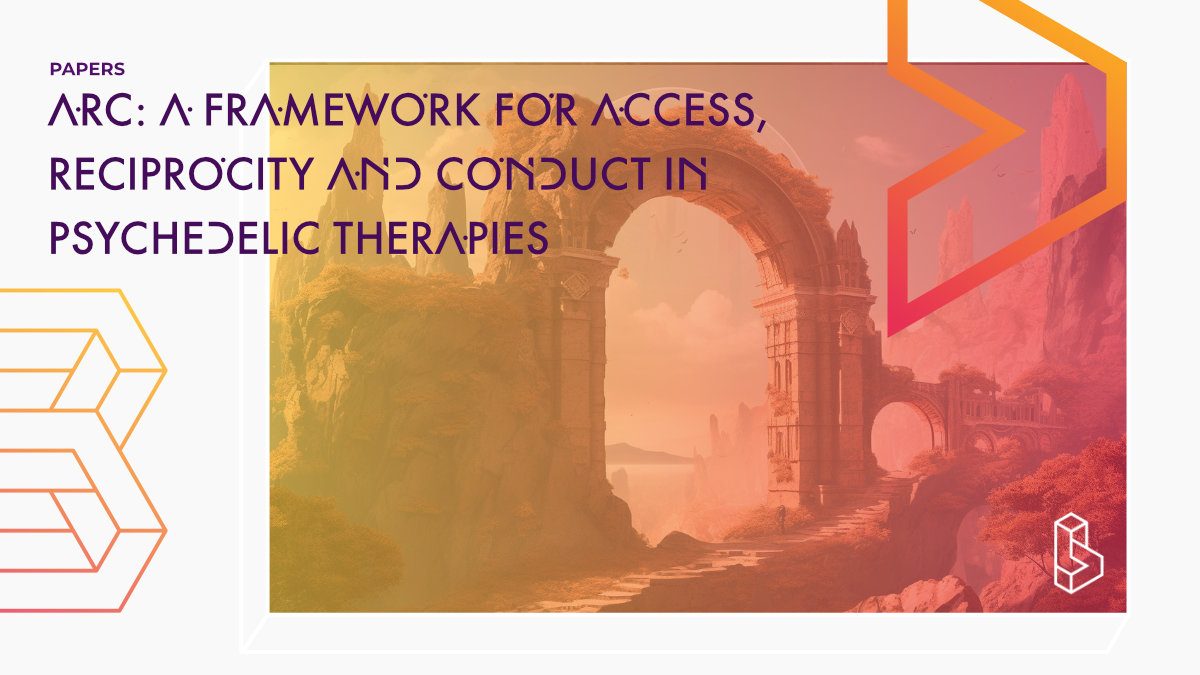This theory-building article (2023) presents the ARC (Access, Reciprocity and Conduct) framework, a culturally informed ethical infrastructure for psychedelic-assisted therapy (PAT). The ARC framework emphasizes equitable access to PAT for mental health treatment needs, ensures safety in clinical contexts, and acknowledges the traditional and spiritual uses of psychedelic medicines. Developed using a dual-phase co-design approach, it invites contributions and feedback from stakeholders across research, industry, therapy, community, and indigenous settings to address the complex ethical questions arising in the rapidly expanding field of PAT.
Abstract of ARC: a framework for access, reciprocity and conduct in psychedelic therapies
“The field of psychedelic assisted therapy (PAT) is growing at an unprecedented pace. The immense pressures this places on those working in this burgeoning field have already begun to raise important questions about risk and responsibility. It is imperative that the development of an ethical and equitable infrastructure for psychedelic care is prioritized to support this rapid expansion of PAT in research and clinical settings. Here we present Access, Reciprocity and Conduct (ARC); a framework for a culturally informed ethical infrastructure for ARC in psychedelic therapies. These three parallel yet interdependent pillars of ARC provide the bedrock for a sustainable psychedelic infrastructure which prioritized equal access to PAT for those in need of mental health treatment (Access), promotes the safety of those delivering and receiving PAT in clinical contexts (Conduct), and respects the traditional and spiritual uses of psychedelic medicines which often precede their clinical use (Reciprocity). In the development of ARC, we are taking a novel dual-phase co-design approach. The first phase involves co-development of an ethics statement for each arm with stakeholders from research, industry, therapy, community, and indigenous settings. A second phase will further disseminate the statements for collaborative review to a wider audience from these different stakeholder communities within the psychedelic therapy field to invite feedback and further refinement. By presenting ARC at this early stage, we hope to draw upon the collective wisdom of the wider psychedelic community and inspire the open dialogue and collaboration upon which the process of co-design depends. We aim to offer a framework through which psychedelic researchers, therapists and other stakeholders, may begin tackling the complex ethical questions arising within their own organizations and individual practice of PAT.“
Authors: Meg J. Spriggs, Ashleigh Murphy-Beiner, Roberta Murphy, Julia Bornemann, Hannah Thurgur & Anne K. Schlag
Summary of ARC: a framework for access, reciprocity and conduct in psychedelic therapies
Despite overall growth in mental health research, the proportion of studies looking at new interventions has declined, and there have been few major pharmaceutical breakthroughs since the 1950s. There is also a growing recognition of mental wellbeing’s broader social, ecological, and socio-economic determinants.
Psychedelic-assisted therapy (PAT) is a new paradigm shift suggested to address many of psychiatry’s challenges. Since 2006, there has been extensive growth in the number of clinical trials conducted and funding for these trials.
Find this paper
ARC: a framework for access, reciprocity and conduct in psychedelic therapies
https://doi.org/10.1017/S0033291722002963
Open Access | Google Scholar | Backup | 🕊
Cite this paper (APA)
Spriggs, M. J., Murphy-Beiner, A., Murphy, R., Bornemann, J., Thurgur, H., & Schlag, A. K. ARC: A framework for Access, Reciprocity and Conduct in psychedelic therapies. Frontiers in Psychology, 14, 1583.

